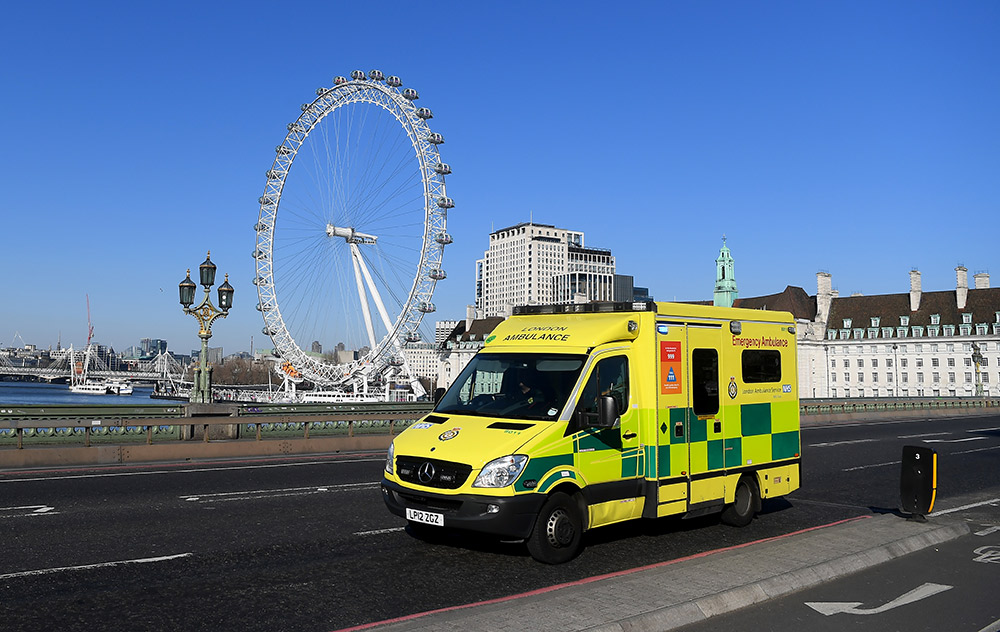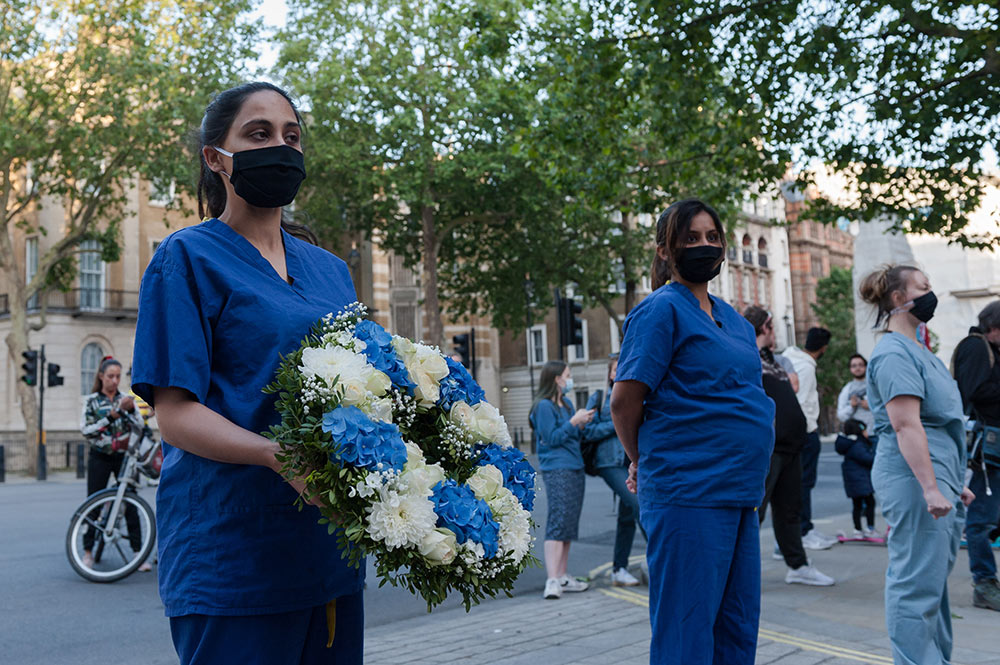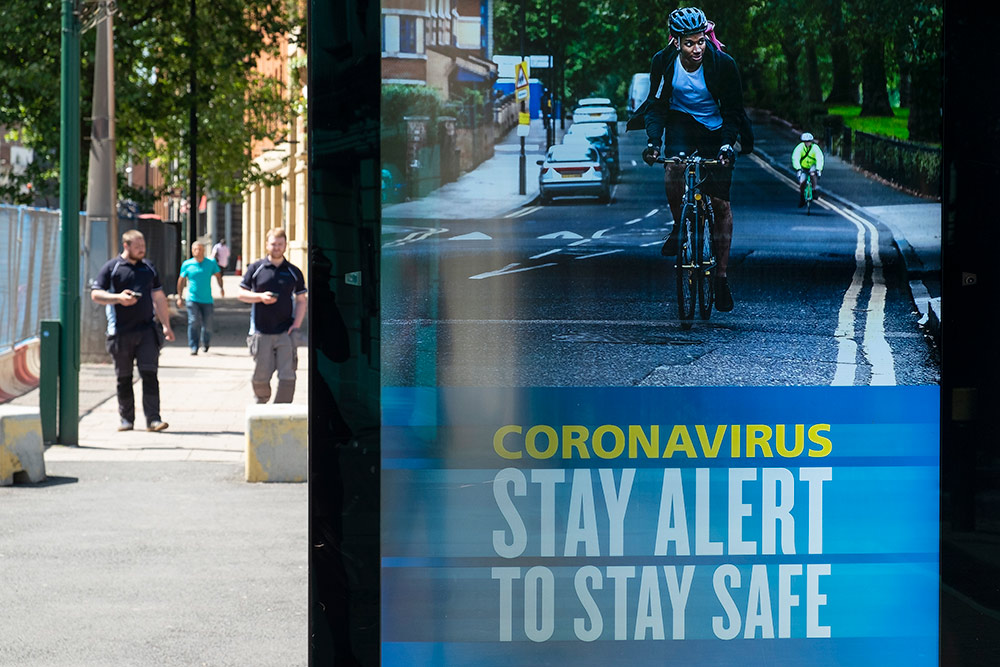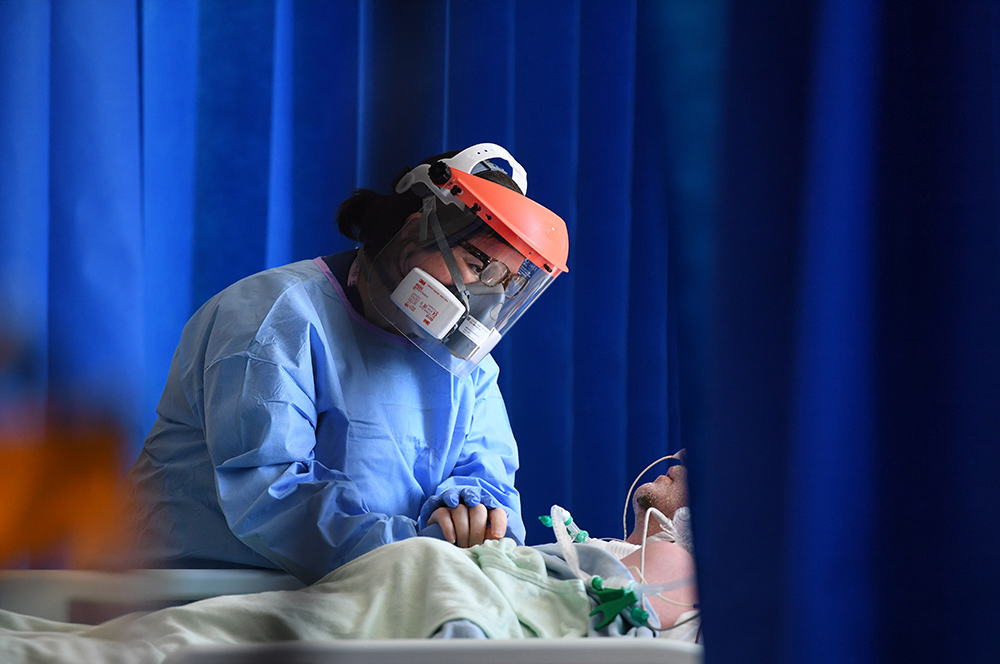周四,在警察的贴身护卫下,英国首相鲍里斯·约翰逊未戴口罩会见记者,吹捧英国在减少新冠疫情死亡人数方面取得的“巨大成功”。
然而“巨大成功”的宣言却未引起任何轰动。几个小时后,约翰逊政府出人意外地下令在英格兰北部实行封锁,以遏制大曼彻斯特地区及其周围地区感染人数的疯涨。封锁令禁止400万多个公民与邻居举行室内聚会。此时英国经济正陷入300年来最严重的衰退之际。
英国仍处于高度戒备状态。迄今为止,英国有46,000多人死亡,与邻国相比,死亡人数过高。英国自身的统计机构已经证实,仅英格兰一个地区的死亡人数就超过了欧洲任何一个国家的非正常死亡人数。同时,根据约翰·霍普金斯大学的“死亡率分析”,截至7月31日,英国的人均死亡率和绝对死亡人数均位居世界第三,仅次于美国和巴西。这实在太糟糕了。
事情本不应这样发展。在大流行最初几周里,约翰逊本人多次声称,英国比大多数国家都做了更为充分的准备,他还通过引用备受喜爱的国家卫生局和世界领先的医学研究机构的说法,呼吁人们保持冷静。

牛津大学政治思想和政治象征论专家Tae-Yeoun Keum说:“众所周知,2020年英国的历史性事件应该是英国脱欧。”
但是,她补充说,未来有一天,历史老师可能会向后代们传播大流行时期英国的教训,并特别提到那时的英国政府只有一个目标,那就是脱欧。
她说:“而不是为了应对百年一遇的全球流行病。”
“洗洗手,继续唱生日快乐歌"
英国防疫的转折点发生在3月初。
随着病毒席卷欧洲,英国的感染病例开始增多。但政府的方法迅速偏离了其他地区。首相及其顾问选择了温和的措施来对抗病毒。内心深处,他们似乎担心英国公众无法忍受正在欧洲大陆实施的限制性封锁措施。
政府在很短的时间内考虑过“群体免疫”方法,之后就将其放弃。与此同时,即使感染人数增加,约翰逊还是推迟宣布封锁计划。
还是企业、公众、甚至是英格兰足球超级联赛(Premier Football League)和皇室(Royal Family)等代表性英国机构在政府给出建议之前站了出来:取消活动,并在政府下令要求学生和雇员回家之前将他们送回家。
最终英国屈服,并于3月24日进入封锁状态。结果:英国经济停滞的时间比大多数其他欧洲国家长。但是到那时破坏已经形成。

伦敦米德尔塞克斯大学(Middlesex University)学生体验办公室员工大卫·吉拉尼说道:“我觉得,作为一个国家,英国在感染人数较低时并没有认真对待它。”“显然,一旦数字增加,我们才开始更认真地对待它,但是那时已经为时已晚。”
他说,当欧洲其他国家急于实行越来越严格的封锁措施时,“英国只是倡导人们洗手,然后继续唱生日快乐歌。”
当然,政府的科学顾问以及帝国理工学院传染病暴发模型小组负责人的尼尔·弗格森承认,提前一周将英国封锁起来可能会将死亡人数减少一半。尽管如此,他最终还是为政府的行动进行了辩护。
事实证明,从长远来看,这并不是最好的选择
4月份死亡人数飙升,新的担忧出现了:在国家削减资金多年后,英国的国家医疗保健系统能否真正应对一大波新冠疫情感染者?
很快,前线医务人员防护设备严重短缺的问题就暴露出来。更为严重的是,大规模测试的起步时间比计划的要晚很多。到4月,英国卫生部长马特·汉考克面临着落后于竞争对手的测试记录,并将英国的落后归咎于诊断行业规模太小,并承诺要建立一个“大规模”的诊断行业。

与此同时,由于病毒死亡的必要工作者(从医护人员到过境驾驶员)以及黑人和亚裔英国人的比例严重偏高。例如,一项政府研究发现,死于新冠疫情的黑人人数是白人的四倍多,而这主要是由于社会经济因素造成的。
对于因英国脱欧谈判而在英国人民中失去地位的英国政府而言,失误愈发严重。英国脱欧谈判历经数年,却收效甚微。
历史学家以及《英国兴衰:二十世纪英国史》的作者大卫·艾格顿说道,长期以来,英国一直为自己拥有世界一流的公共机构而感到骄傲。但这些机构“从长远来看,并不是最好的选择,这在政治上有很重大的意义。”他说。“疫情正给英国带来相当广泛的危机。”
“鲍里斯在分散国家注意力方面做得很出色”
最低点发生在3月27日。那时,英国政府告知公众约翰逊的冠状病毒检测结果呈阳性。他被紧急送往伦敦一家医院接受重症监护,且一个月以来,首相基本上没有在公众视线范围内出现过。
约翰逊抱恙给英国政府高层留下了巨大的权力真空——因为英国没有副首相,因此每日新闻发布会由各内阁成员轮流举行,而对于谁在政府中真正拥有最终决定权这一问题并不明确。
当公众由于首相抱恙开始表示同情时,首相的缺席暴露其内阁中领导力的缺失。这也清楚地表明,英国在很大程度上依赖约翰逊的优秀才能:擅长利用幽默感,偏好浮夸的爱国象征主义,向公众表达心声,同时掩盖紧急计划的所有实际细节。

这种方法大部分都依赖约翰逊独特的沟通方式:随意、引人入胜、不在乎细节,并且常常带有轻视的色彩。他经常将批评家的担忧—无论是针对英国脱欧谈判还是大流行—都归结为反应过度。例如,在从筹备到封锁的整个过程中,他经常使用新的措辞进行呼吁,呼吁通过“压平曲线”来“把病毒压扁”。这一刺耳的笑话在不断增加的死亡人数中更加醒目。
“鲍里斯善于分散人们的注意力,”英格兰西南部的高级重症监护护士艾米丽·福伊尔说道。“开个玩笑,轻描淡写,重新引导舆论,这是他的政治策略。”
“我不知道‘保持警惕’是什么意思”
约翰逊在病愈后重新开始公共生活,并开始着手规划英国如何从封锁中崛起。
由此产生了一个饱受嘲笑的电视讲话,该讲话中约翰逊将“待在家里”的明确指示变为“保持警惕”的诫命。
约翰逊经常使用流行语,包括去年12月他倒向多数政府,并作出令人心动的承诺,即要“实现脱欧”。但是这一次,消息令人困惑不解。

苏格兰民族党领袖尼古拉·斯特金反驳说:“我不知道‘保持警惕’是什么意思。”她补充说,她从报纸上得知了这一变化。斯特金命令苏格兰人无视约翰逊,并继续待在家里。像威尔士和北爱尔兰一样,苏格兰选择设定自己的步调,这表明约翰逊在以交错方式重新开放过程中往往仅代表英格兰发言。
尽管在大流行期间区域分裂几乎困扰着每个国家,但英国的那些分裂却存在于具有不同身份的民族之间—这就像英国脱欧公投使得国家划分成对未来具有不同愿景的派别:例如,英格兰投票决定退出欧盟,而苏格兰投票决定留下。
当约翰逊政府真正选择注重细节时,又过于详细。举例来说,英国的重新开放计划造成了黑色幽默式的困惑:从家庭聚会规则到在酒吧里大声交谈的限制。
牛津大学的琴说道,从始至终,约翰逊都在呼吁公众运用其“英国常识”智慧,这种方式在英国脱欧方面经常提及。
她说:“从很多方面来看,英国脱欧的故事一方面是英国例外主义的故事,另一方面是证实神秘的普通人的世界观的故事,”
“这两个故事在政府的防疫过程中都以某种形式再次出现。只是这次,政府在确定人们想听何种内容,并据此作出反应过程中误判了其所依据的信息。”
“国家审计”
爱丁堡大学公共卫生名誉教授拉吉·博帕尔权衡了英国6月中旬的防疫动作,指出,回望历史的镜子是“一种很棒的工具,但它从未被发明。”
在大流行中,人们总是事后诸葛亮,并且世界上没有一个政府能完美地摆脱危机,因为在危机中往往没有好的选择,只有不得已的选择。
但是,将后见之明完全抛之脑后很危险,因为各国面临着可能持续数月甚至数年的社会隔离措施和封锁的前景,这使得从过去的选择中吸取教训至关重要。
尽管各国在收集数据的方式上确实存在统计差异,且尽管有相反的证据,但约翰逊始终将国家的高死亡人数歪曲为一种统计方面的误解,以爱国的姿态宣扬“成功”的消息。这些做法达到了不愿意妥协或不愿意与英国公众坦诚相处的程度,其在英国多年脱欧艰难时期,已经为人们所熟悉,因为不确定的、分歧严重的公众试图摸索自己的方式,以找到更明朗的政治前途。

这种情景令人担忧,因为其不仅会影响公众信任和安全,而且还会影响以英国为核心的国际联盟之间的纽带力量以及英国提升其世界地位。
艾格顿说:“我认为这已经非常清楚地表明了英国国家、英国政府、福利国家、精英进行理性政治言论的能力的不足。这确实显示了英国在世界上所处的真实地位。英国脱欧和新冠疫情之后,没有任何知情人士或者半知情人士可以坚持认为英国是世界上领先的国家之一。”
当前进行“国家审计”的时机已经成熟,他警告说,“是时候清醒一下了。”(财富中文网)
翻译:郝秀
审校:汪皓
周四,在警察的贴身护卫下,英国首相鲍里斯·约翰逊未戴口罩会见记者,吹捧英国在减少新冠疫情死亡人数方面取得的“巨大成功”。
然而“巨大成功”的宣言却未引起任何轰动。几个小时后,约翰逊政府出人意外地下令在英格兰北部实行封锁,以遏制大曼彻斯特地区及其周围地区感染人数的疯涨。封锁令禁止400万多个公民与邻居举行室内聚会。此时英国经济正陷入300年来最严重的衰退之际。
英国仍处于高度戒备状态。迄今为止,英国有46,000多人死亡,与邻国相比,死亡人数过高。英国自身的统计机构已经证实,仅英格兰一个地区的死亡人数就超过了欧洲任何一个国家的非正常死亡人数。同时,根据约翰·霍普金斯大学的“死亡率分析”,截至7月31日,英国的人均死亡率和绝对死亡人数均位居世界第三,仅次于美国和巴西。这实在太糟糕了。
事情本不应这样发展。在大流行最初几周里,约翰逊本人多次声称,英国比大多数国家都做了更为充分的准备,他还通过引用备受喜爱的国家卫生局和世界领先的医学研究机构的说法,呼吁人们保持冷静。
牛津大学政治思想和政治象征论专家Tae-Yeoun Keum说:“众所周知,2020年英国的历史性事件应该是英国脱欧。”
但是,她补充说,未来有一天,历史老师可能会向后代们传播大流行时期英国的教训,并特别提到那时的英国政府只有一个目标,那就是脱欧。
她说:“而不是为了应对百年一遇的全球流行病。”
“洗洗手,继续唱生日快乐歌"
英国防疫的转折点发生在3月初。
随着病毒席卷欧洲,英国的感染病例开始增多。但政府的方法迅速偏离了其他地区。首相及其顾问选择了温和的措施来对抗病毒。内心深处,他们似乎担心英国公众无法忍受正在欧洲大陆实施的限制性封锁措施。
政府在很短的时间内考虑过“群体免疫”方法,之后就将其放弃。与此同时,即使感染人数增加,约翰逊还是推迟宣布封锁计划。
还是企业、公众、甚至是英格兰足球超级联赛(Premier Football League)和皇室(Royal Family)等代表性英国机构在政府给出建议之前站了出来:取消活动,并在政府下令要求学生和雇员回家之前将他们送回家。
最终英国屈服,并于3月24日进入封锁状态。结果:英国经济停滞的时间比大多数其他欧洲国家长。但是到那时破坏已经形成。
伦敦米德尔塞克斯大学(Middlesex University)学生体验办公室员工大卫·吉拉尼说道:“我觉得,作为一个国家,英国在感染人数较低时并没有认真对待它。”“显然,一旦数字增加,我们才开始更认真地对待它,但是那时已经为时已晚。”
他说,当欧洲其他国家急于实行越来越严格的封锁措施时,“英国只是倡导人们洗手,然后继续唱生日快乐歌。”
当然,政府的科学顾问以及帝国理工学院传染病暴发模型小组负责人的尼尔·弗格森承认,提前一周将英国封锁起来可能会将死亡人数减少一半。尽管如此,他最终还是为政府的行动进行了辩护。
事实证明,从长远来看,这并不是最好的选择
4月份死亡人数飙升,新的担忧出现了:在国家削减资金多年后,英国的国家医疗保健系统能否真正应对一大波新冠疫情感染者?
很快,前线医务人员防护设备严重短缺的问题就暴露出来。更为严重的是,大规模测试的起步时间比计划的要晚很多。到4月,英国卫生部长马特·汉考克面临着落后于竞争对手的测试记录,并将英国的落后归咎于诊断行业规模太小,并承诺要建立一个“大规模”的诊断行业。
与此同时,由于病毒死亡的必要工作者(从医护人员到过境驾驶员)以及黑人和亚裔英国人的比例严重偏高。例如,一项政府研究发现,死于新冠疫情的黑人人数是白人的四倍多,而这主要是由于社会经济因素造成的。
对于因英国脱欧谈判而在英国人民中失去地位的英国政府而言,失误愈发严重。英国脱欧谈判历经数年,却收效甚微。
历史学家以及《英国兴衰:二十世纪英国史》的作者大卫·艾格顿说道,长期以来,英国一直为自己拥有世界一流的公共机构而感到骄傲。但这些机构“从长远来看,并不是最好的选择,这在政治上有很重大的意义。”他说。“疫情正给英国带来相当广泛的危机。”
“鲍里斯在分散国家注意力方面做得很出色”
最低点发生在3月27日。那时,英国政府告知公众约翰逊的冠状病毒检测结果呈阳性。他被紧急送往伦敦一家医院接受重症监护,且一个月以来,首相基本上没有在公众视线范围内出现过。
约翰逊抱恙给英国政府高层留下了巨大的权力真空——因为英国没有副首相,因此每日新闻发布会由各内阁成员轮流举行,而对于谁在政府中真正拥有最终决定权这一问题并不明确。
当公众由于首相抱恙开始表示同情时,首相的缺席暴露其内阁中领导力的缺失。这也清楚地表明,英国在很大程度上依赖约翰逊的优秀才能:擅长利用幽默感,偏好浮夸的爱国象征主义,向公众表达心声,同时掩盖紧急计划的所有实际细节。
这种方法大部分都依赖约翰逊独特的沟通方式:随意、引人入胜、不在乎细节,并且常常带有轻视的色彩。他经常将批评家的担忧—无论是针对英国脱欧谈判还是大流行—都归结为反应过度。例如,在从筹备到封锁的整个过程中,他经常使用新的措辞进行呼吁,呼吁通过“压平曲线”来“把病毒压扁”。这一刺耳的笑话在不断增加的死亡人数中更加醒目。
“鲍里斯善于分散人们的注意力,”英格兰西南部的高级重症监护护士艾米丽·福伊尔说道。“开个玩笑,轻描淡写,重新引导舆论,这是他的政治策略。”
“我不知道‘保持警惕’是什么意思”
约翰逊在病愈后重新开始公共生活,并开始着手规划英国如何从封锁中崛起。
由此产生了一个饱受嘲笑的电视讲话,该讲话中约翰逊将“待在家里”的明确指示变为“保持警惕”的诫命。
约翰逊经常使用流行语,包括去年12月他倒向多数政府,并作出令人心动的承诺,即要“实现脱欧”。但是这一次,消息令人困惑不解。
苏格兰民族党领袖尼古拉·斯特金反驳说:“我不知道‘保持警惕’是什么意思。”她补充说,她从报纸上得知了这一变化。斯特金命令苏格兰人无视约翰逊,并继续待在家里。像威尔士和北爱尔兰一样,苏格兰选择设定自己的步调,这表明约翰逊在以交错方式重新开放过程中往往仅代表英格兰发言。
尽管在大流行期间区域分裂几乎困扰着每个国家,但英国的那些分裂却存在于具有不同身份的民族之间—这就像英国脱欧公投使得国家划分成对未来具有不同愿景的派别:例如,英格兰投票决定退出欧盟,而苏格兰投票决定留下。
当约翰逊政府真正选择注重细节时,又过于详细。举例来说,英国的重新开放计划造成了黑色幽默式的困惑:从家庭聚会规则到在酒吧里大声交谈的限制。
牛津大学的琴说道,从始至终,约翰逊都在呼吁公众运用其“英国常识”智慧,这种方式在英国脱欧方面经常提及。
她说:“从很多方面来看,英国脱欧的故事一方面是英国例外主义的故事,另一方面是证实神秘的普通人的世界观的故事,”
“这两个故事在政府的防疫过程中都以某种形式再次出现。只是这次,政府在确定人们想听何种内容,并据此作出反应过程中误判了其所依据的信息。”
“国家审计”
爱丁堡大学公共卫生名誉教授拉吉·博帕尔权衡了英国6月中旬的防疫动作,指出,回望历史的镜子是“一种很棒的工具,但它从未被发明。”
在大流行中,人们总是事后诸葛亮,并且世界上没有一个政府能完美地摆脱危机,因为在危机中往往没有好的选择,只有不得已的选择。
但是,将后见之明完全抛之脑后很危险,因为各国面临着可能持续数月甚至数年的社会隔离措施和封锁的前景,这使得从过去的选择中吸取教训至关重要。
尽管各国在收集数据的方式上确实存在统计差异,且尽管有相反的证据,但约翰逊始终将国家的高死亡人数歪曲为一种统计方面的误解,以爱国的姿态宣扬“成功”的消息。这些做法达到了不愿意妥协或不愿意与英国公众坦诚相处的程度,其在英国多年脱欧艰难时期,已经为人们所熟悉,因为不确定的、分歧严重的公众试图摸索自己的方式,以找到更明朗的政治前途。
这种情景令人担忧,因为其不仅会影响公众信任和安全,而且还会影响以英国为核心的国际联盟之间的纽带力量以及英国提升其世界地位。
艾格顿说:“我认为这已经非常清楚地表明了英国国家、英国政府、福利国家、精英进行理性政治言论的能力的不足。这确实显示了英国在世界上所处的真实地位。英国脱欧和新冠疫情之后,没有任何知情人士或者半知情人士可以坚持认为英国是世界上领先的国家之一。”
当前进行“国家审计”的时机已经成熟,他警告说,“是时候清醒一下了。”(财富中文网)
翻译:郝秀
审校:汪皓
On Thursday, British prime minister Boris Johnson made a maskless appearance in front of reporters, elbow-bumping with police officers while touting the country's “massive success” in reducing the death toll of COVID-19.
The “massive success” declaration landed with a hollow thud. Hours later, the Johnson government ordered the surprise lockdown in the North of England to curb spikes in and around the Greater Manchester area. More than 4 million citizens were banned from holding indoor gatherings with neighbors. It comes as the British economy has plunged into what is expected to be the worst recession in 300 years.
The country is still on high alert. With more than 46,000 dead, the U.K. has so far endured a disproportionately high death toll compared to neighboring countries. The U.K.’s own statistics body has confirmed that England alone had the highest numbers of excess deaths of any European nation. Meanwhile, as of July 31, the John Hopkins’ Mortality Analyses puts the U.K. at third in the world in both per-capita, and absolute deaths—where it trails only the U.S. and Brazil. Not good company.
It wasn’t supposed to be this way. Johnson himself repeatedly claimed throughout the early weeks of the pandemic that the U.K. was better prepared than most, citing the beloved National Health Service and world-leading medical research institutions as calls for calm.
“As we all know, the history-making event of 2020 for the U.K. was supposed to be Brexit,” says Tae-Yeoun Keum, an expert in political thought and symbolism at Oxford University.
But, she added, the history teachers of future generations may one day teach the lessons of pandemic-era Britain by noting that it was being run by a government with a singular purpose and little else—to get the U.K. out of the European Union.
“Not,” she said, “for the purposes of handling a once-in-a-century global pandemic.”
"Washing our hands and singing Happy Birthday."
The turning point in the U.K.’s management of the pandemic occurred in early March.
As the virus engulfed Europe, cases began to rise in the U.K. But the government’s approach quickly diverged from the rest of the region. The prime minister and his advisors opted for moderate measures to halt the virus. Deep down, they appeared to fear the British public wouldn’t tolerate the restrictive lockdown measures being enforced in continental Europe.
The government briefly flirted with the “herd immunity" approach, then abandoned it. Johnson, meanwhile, delayed announcing a lockdown plan even as numbers rose.
It was companies, the public, and even iconic British institutions like the Premier Football League and the Royal Family that stepped out ahead of government advice: cancelling events and sending students and employees home before they were ordered to do so.
The country eventually buckled, and went into lockdown on March 24. The result: the economy stayed shut for longer than most other European countries. But by then the damage was done.
“I felt like, as a country, the U.K. wasn’t taking it seriously when the numbers were low,” says David Gilani, an employee in the student experience office at London’s Middlesex University, which closed down ahead of government orders. “Obviously once the numbers were higher, we were taking it more seriously—but by that point, it was too late.”
While other European countries were rushing to enforce stricter and stricter lockdowns, he says, “the U.K. was just washing our hands and singing Happy Birthday.”
Sure enough, Neil Ferguson, a scientific advisor to the government who also leads the infectious outbreak modeling group at Imperial University, admitted that locking the country down one week earlier could have cut the death toll by half. Still, he ultimately defended the government’s actions.
'It turned out to not be the best by a long shot'
Once the death toll soared in April, there was a new concern: could the country’s national health care system, after enduring years of funding cuts, truly cope with a wave of COVID-19 cases?
It was quickly revealed frontline medical workers were doing battle with a fatal shortage of protective equipment. Adding to the problem, wide-scale testing at the start was way behind schedule. By April, health secretary Matt Hancock, facing a testing record that trailed rival nations, blamed the U.K.’s record on a small diagnostics industry, and pledged to build one “at scale.”
Meanwhile, the toll of the virus was hitting the country’s essential workers, from healthcare workers to transit drivers, as well as Black and Asian Britons, disproportionately hard. A government study found that Black men, for example, were more than four times more likely to die from COVID-19 than white men, largely due to socio-economic factors.
The missteps loomed larger for a government that had lost its standing with the British people over a Brexit negotiation that had spun on for years and accomplished so little.
The U.K. has long prided itself on the world-beating class of its public institutions, says David Edgerton, a historian and author of The Rise and Fall of the British Nation: A 20th Century History. But those institutions have “turned out not to be the best by a long shot, and that's very politically significant,” he says. “It is turning into a pretty general crisis of the British state.”
"Boris is brilliant at distracting the country"
The low point came on March 27. That's when the British government informed the public that Johnson had tested positive for coronavirus. He was rushed into intensive care at a London hospital, and for a month, the prime minister was largely out of public sight.
Johnson's illness left a gaping power vacuum at the top of the government—because Britain does not have a deputy prime minister, the daily press conferences rotated between the cabinet members, with little clarity about who in government actually had the final word.
While the illness rallied public sympathy around the prime minister, his absence exposed a leadership void in his own cabinet. It also made clear how much the country had become reliant on Johnson's great talents: using humor, and a preference for grandiose, patriotic symbolism, to speak to the hearts of the public—while glossing over any real detail of an emergency plan.
Much of that approach is wrapped up in Johnson’s singular communication style: casual, catchy, loose on the details, and often dismissive. He frequently frames his critics’ concerns—whether over Brexit negotiations, or the pandemic—as over-reactions. Throughout the lead-up to the lockdown, for example, he frequently re-framed the call to “flatten the curve” as an effort to “squash the sombrero.” It was a jarring joke that stood out amid updates on rising death tolls.
“Boris is brilliant at kind of distracting the country,” says Emily Foyle, a senior critical care nurse in England's southwest. “To make jokes, make light of things, redirect things—that’s his political strategy.”
"I don't know what 'stay alert' means"
After resuming public life after his recovery, Johnson set out to map out how the country would emerge from lockdown.
That resulted in a much-mocked televised address to switch the country from the clear directive of “stay at home” to the commandment “stay alert.”
Johnson has frequently employed catchphrases, including when he swung to a majority government in December on the catchy pledge to “Get Brexit Done.” But this time, the message confounded.
“I don’t know what ‘stay alert’ means,” retorted Nicola Sturgeon, the leader of the Scottish National Party, adding that she had learned of the change from the newspapers. Sturgeon ordered Scots to ignore Johnson, and continue to stay home. Like Wales and Northern Ireland, Scotland chose to set its own pace, revealing that throughout the staggered reopening, Johnson frequently spoke for England alone.
Though regional divisions have dogged nearly every country during the pandemic, those divisions in the U.K. exist between nations with their own distinct identities—and echo the ways the Brexit vote had carved up the country into differing visions for the futures: England, for example, voted to leave the EU. Scotland voted to stay.
When the Johnsons government did opt for detail, it was too detailed. The U.K.’s reopening plan, for example, produced darkly comedic levels of confusion: from the rules for seeing family members one at a time, to restrictions on loud conversations in pubs.
Throughout, Johnson’s appeal to the wisdom of “British common sense” was a defining theme, Oxford's Keum says, in a way that was frequently evoked in relation to Brexit.
“The story advanced by the Brexit campaign has in many ways been a story of British exceptionalism on the one hand, and a story of validating the world views of the mythical everyman on the other,” she says.
“Both these stories have resurfaced in some form in the government’s pandemic response. Only this time, the ideas informing the government’s response about what people want to hear appears to have been misjudged.”
An "audit of the nation"
Weighing the U.K.’s response to the pandemic back in mid-June, Raj Bhopal, an emeritus professor of public health at Edinburgh University, noted that the retrospectoscope is “a wonderful instrument—but it was never invented.”
In a pandemic, hindsight is always 20:20, and no government on earth has come off perfectly from a crisis that has frequently presented no good choices—only bad ones.
But to abandon hindsight entirely would be a dangerous exercise, as countries face the prospect of social distancing measures and lockdowns that will last for months, even years, making learning from past choices a crucial exercise.
And though statistical differences do exist in how countries collect data, Johnson has consistently misrepresented the country's high death toll as a statistical misunderstanding, flogging a message of patriotic "success" despite evidence to the contrary. The efforts harken back to an unwillingness to compromise, or to level honestly with the British public, that has become all-too-familiar in the years of Brexit-era purgatory, as an uncertain and badly divided public has attempted to feel its way towards a clearer political future.
It's a worrying picture that has implications not just for public trust and safety, but for the strength of the bond between the union of nations at Britain’s core—and for the country’s larger standing in the world.
“I think it’s made very clear the deficiencies of the British state, the British administration, the welfare state, the capacity for the rational political discourse of the elite,” said Edgerton. “It really shows the reality of Britain’s place in the world. After both Brexit and COVID-19, no informed person, no semi-informed person, could maintain that Britain is one of the leading countries in the world.”
The current moment is ripe for an “audit of the nation,” he warned. “It’s wake up time.”






